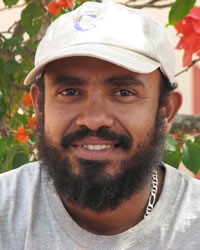Deaf in Jamaica

Photo Source:
David Bennett
|
Send Joshua Project a map of this people group.
|
| People Name: | Deaf |
| Country: | Jamaica |
| 10/40 Window: | No |
| Population: | 7,500 |
| World Population: | 27,508,450 |
| Primary Language: | Jamaican Sign Language |
| Primary Religion: | Unknown |
| Christian Adherents: | 0.00 % |
| Evangelicals: | 0.00 % |
| Scripture: | Portions |
| Ministry Resources: | No |
| Jesus Film: | No |
| Audio Recordings: | No |
| People Cluster: | Deaf |
| Affinity Bloc: | Deaf |
| Progress Level: |
|
Introduction / History
The members of the Jamaican Deaf community are located on the Caribbean island of Jamaica. The highest population is found in the capital city of Kingston with other significant populations found in Mandeville, St. Elizabeth parish, and Montego Bay. Though the exact number of signing Deaf people is uncertain, the national Deaf association has estimated that there are 27,000 people with hearing loss.
What Are Their Lives Like?
There are twelve Deaf schools and two vocational training programs. The national Deaf association runs seven schools and one vocational program, and religious entities operate the other five schools and vocational program. The association-run schools are adopting a bilingual approach, utilizing both written English and Jamaican Sign Language (JSL), a natural signed language with a distinct grammar that differs from English. Three of the affiliated religious schools use a Signed English/Total Communication approach (manual signs follow English grammar and are used in conjunction with speaking). In contrast, the other schools use Jamaican Sign Language. Few Deaf students are mainstreamed into hearing classrooms.
Deaf Jamaicans often gather at Deaf associations, Deaf clubs, social gatherings, and religious services where they use Jamaican Sign Language. There is one national Deaf association, headquartered in Kingston. There are several Deaf clubs and regular gathering places where Deaf people socialize during the weekends. There are eleven Deaf religious services—three are evangelical and eight are Jehovah's Witnesses Kingdom Halls. Some churches provide interpreted services. There are few or no resources available in JSL, although there are English-language books with biographies of Deaf Jamaicans.
What Are Their Beliefs?
Most Jamaicans are Christian, and families probably expose their Deaf children to the gospel. Because of their communication limits, it's hard to know how much they understand.
What Are Their Needs?
Many Deaf Jamaicans have difficulty securing employment, but the people who do have jobs are often employed in Deaf education, association-related, or manual labor positions. The Jamaican Deaf community is unified with a common identity and is very proud to have its own Jamaican Deaf culture. Jamaican Deaf people indicate that their primary community development needs are more skilled interpreters, a Jamaican Sign Language dictionary, and improved education.
Prayer Points
Pray for the provision of biblical materials in accessible formats for the Deaf in Jamaica.
Pray for anointed missionaries to go to the Deaf in Jamaica.
Pray for the Lord to reach Deaf men and women in Jamaica so they may share Christ with others.
Pray for training for Deaf evangelism and discipleship.